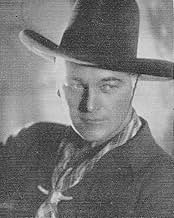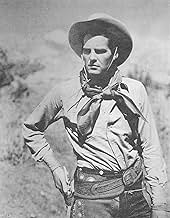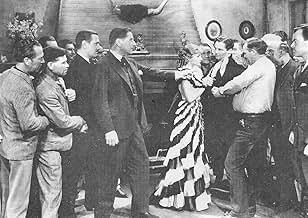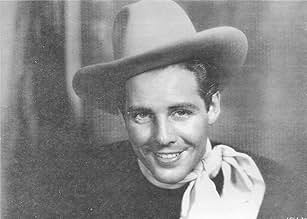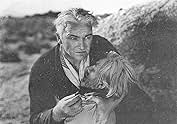An evil ranch foreman tries to provoke a range war by playing two cattlemen against each other while helping a gang to rustle the cattle.An evil ranch foreman tries to provoke a range war by playing two cattlemen against each other while helping a gang to rustle the cattle.An evil ranch foreman tries to provoke a range war by playing two cattlemen against each other while helping a gang to rustle the cattle.
James Ellison
- Johnny Nelson
- (as Jimmy Ellison)
George 'Gabby' Hayes
- Uncle Ben
- (as George Hayes)
Sid Jordan
- Wrangler
- (uncredited)
Pascale Perry
- Outlaw Guard
- (uncredited)
Joe Phillips
- Party Guest
- (uncredited)
Monte Rawlins
- Cowhand Party Guest
- (uncredited)
- Director
- Writers
- All cast & crew
- Production, box office & more at IMDbPro
Storyline
Did you know
- TriviaWilliam Boyd was originally offered the role of Buck Peters, the Bar 20 ranch foreman, but chose the role of Cassidy.
- ConnectionsEdited into Border Justice (1951)
- SoundtracksFollowin' the Stars
Music and lyrics by Sam H. Stept and Dave Franklin
Sung by James Ellison and Frank McGlynn Jr.
Played as background music often
Featured review
William Boyd, a hugely popular actor during the silent film era, saw his career wilting in the early 1930s after a mix-up by a newspaper sent his reputation spiraling downwards. When he auditioned for Paramount Pictures' low-budgeted Western, August 1935 "Hop-Along Cassidy," the studio offered him the role as one of the ranch supervisors-but not the lead. Boyd knew his on-screen magnetic personality was perfect for the series' hero, and lobbied hard for the role as Bill Hop-Along Cassidy. The actor eventually beat out his competition, and the life-changing role became one of Hollywood's more feel-good stories in cinema.
Western movies had been relegated to 'Poverty Row" status ever since the spectacular failure of Raoul Walsh's 1930 "The Big Trail." The Grade B "program westerns" were quickly churned out with their low quality camerawork and acting, and played in largely rural theaters. Paramount Pictures wanted to elevate the genre by producing a series with upgraded storylines, higher production values and more polished acting. The studio eventually realized Boyd's past film experience was an asset to achieve its goals. At first the part was offered to James Gleason (not the comedian), but the actor had just signed a deal with RKO and was handcuffed. Once Boyd got the role, the series became a long-lasting fan favorite right from its premier, lasting well beyond going to the new medium of television in 1948. Hopalong Cassidy's programing is credited for making Westerns the most popular genre in the early days of TV.
Boyd first appeared in film in 1918, and was a favorite of director Cecil B. DeMille in his role as Simon in 1927's "The King of Kings." His lead in 1926's silent "The Volga Boatman," DeMille's personal favorite, solidified Boyd's reputation when cinema transitioned to talkies. But RKO cut him loose when its executives read a newspaper account alongside Boyd's picture that he was arrested on gambling and illegal alcohol charges. The editors mixed him up with another actor named William 'Stage" Boyd, who was the real culprit. Yet, when the paper published a correction, "The damage was already done," Boyd lamented. No studio wanted to touch him until 'Stage' Boyd died in 1935, coincidently the same year William earned the Cassidy role.
Boyd's portrayal of Hopalong didn't resemble the title character in Clarence Mulford's 1904 stories. The author's Western hero was rude, rough in speech, and constantly had a chip on his shoulder. The literary character sustained a bullet embedded in his leg during a gunfight, causing him to hop while he walked, earning the nickname 'Hopalong.' Boyd's 'Hopalong' on the screen was civil, friendly, and well-spoken. He consistently appeared on the scene whenever crooks were making honest people's lives miserable. Cassidy was accompanied by a younger man, Johnny, first played by James Ellison, who was always getting into trouble but had a yen for women in distress, along with a grizzled old man first played by actor George 'Gabby' Hayes.
Boyd played in 66 Hopalong Cassidy one-hour movies. When Hollywood studios phased out low-budget films by the time television became popular in 1948, they stopped producing Hopalong features (Boyd financed the final 12 episodes himself.). The actor, though, saw a market for those 66 Hopalong films, and mortgage everything he had, $350,000, to buy the entire catalogue from the studio. The unemployed actor Boyd approached NBC to see if the network was interested in playing some of his old Westerns. Looking for programming to fill its new medium, NBC agreed to air them for a nominal fee. A new generation of viewers grew to love the action-packed films which were shown on Sunday nights. These weekly Sunday evening one-hour Westerns became known as 'Hoppy Nights,' and Boyd emerged as one of TV's first stars, earning not only a fortune for his ownership of the series but he also received lucrative licensing contracts to market Hopalong merchandise.
In the inaugural debut of Hop-along (the only film with a hyphen in his name), Bill Cassidy works for the Bar 20 Ranch, which sees its cattle stolen one-by-one. At a nearby ranch, H2, its foreman, Jack Anthony (Kenneth Thomson), is a cattle rustler leading his gang to steal. He's blaming the Bar 20 Ranch employees for the loss of their cattle, and the two ranches soon become embroiled by Anthony's maneuvers. Writes film reviewer Laura Grieve, "All in all, it's a strong film which set a firm foundation for the many Hopalong Cassidy films and TV episodes to follow."
The character Hopalong Cassidy was nominated by the American Film Institute as one of movie's Heroes of All-Time.
Western movies had been relegated to 'Poverty Row" status ever since the spectacular failure of Raoul Walsh's 1930 "The Big Trail." The Grade B "program westerns" were quickly churned out with their low quality camerawork and acting, and played in largely rural theaters. Paramount Pictures wanted to elevate the genre by producing a series with upgraded storylines, higher production values and more polished acting. The studio eventually realized Boyd's past film experience was an asset to achieve its goals. At first the part was offered to James Gleason (not the comedian), but the actor had just signed a deal with RKO and was handcuffed. Once Boyd got the role, the series became a long-lasting fan favorite right from its premier, lasting well beyond going to the new medium of television in 1948. Hopalong Cassidy's programing is credited for making Westerns the most popular genre in the early days of TV.
Boyd first appeared in film in 1918, and was a favorite of director Cecil B. DeMille in his role as Simon in 1927's "The King of Kings." His lead in 1926's silent "The Volga Boatman," DeMille's personal favorite, solidified Boyd's reputation when cinema transitioned to talkies. But RKO cut him loose when its executives read a newspaper account alongside Boyd's picture that he was arrested on gambling and illegal alcohol charges. The editors mixed him up with another actor named William 'Stage" Boyd, who was the real culprit. Yet, when the paper published a correction, "The damage was already done," Boyd lamented. No studio wanted to touch him until 'Stage' Boyd died in 1935, coincidently the same year William earned the Cassidy role.
Boyd's portrayal of Hopalong didn't resemble the title character in Clarence Mulford's 1904 stories. The author's Western hero was rude, rough in speech, and constantly had a chip on his shoulder. The literary character sustained a bullet embedded in his leg during a gunfight, causing him to hop while he walked, earning the nickname 'Hopalong.' Boyd's 'Hopalong' on the screen was civil, friendly, and well-spoken. He consistently appeared on the scene whenever crooks were making honest people's lives miserable. Cassidy was accompanied by a younger man, Johnny, first played by James Ellison, who was always getting into trouble but had a yen for women in distress, along with a grizzled old man first played by actor George 'Gabby' Hayes.
Boyd played in 66 Hopalong Cassidy one-hour movies. When Hollywood studios phased out low-budget films by the time television became popular in 1948, they stopped producing Hopalong features (Boyd financed the final 12 episodes himself.). The actor, though, saw a market for those 66 Hopalong films, and mortgage everything he had, $350,000, to buy the entire catalogue from the studio. The unemployed actor Boyd approached NBC to see if the network was interested in playing some of his old Westerns. Looking for programming to fill its new medium, NBC agreed to air them for a nominal fee. A new generation of viewers grew to love the action-packed films which were shown on Sunday nights. These weekly Sunday evening one-hour Westerns became known as 'Hoppy Nights,' and Boyd emerged as one of TV's first stars, earning not only a fortune for his ownership of the series but he also received lucrative licensing contracts to market Hopalong merchandise.
In the inaugural debut of Hop-along (the only film with a hyphen in his name), Bill Cassidy works for the Bar 20 Ranch, which sees its cattle stolen one-by-one. At a nearby ranch, H2, its foreman, Jack Anthony (Kenneth Thomson), is a cattle rustler leading his gang to steal. He's blaming the Bar 20 Ranch employees for the loss of their cattle, and the two ranches soon become embroiled by Anthony's maneuvers. Writes film reviewer Laura Grieve, "All in all, it's a strong film which set a firm foundation for the many Hopalong Cassidy films and TV episodes to follow."
The character Hopalong Cassidy was nominated by the American Film Institute as one of movie's Heroes of All-Time.
- springfieldrental
- May 29, 2023
- Permalink
Details
Box office
- Budget
- $85,000 (estimated)
- Runtime1 hour
- Color
- Aspect ratio
- 1.37 : 1
Contribute to this page
Suggest an edit or add missing content



